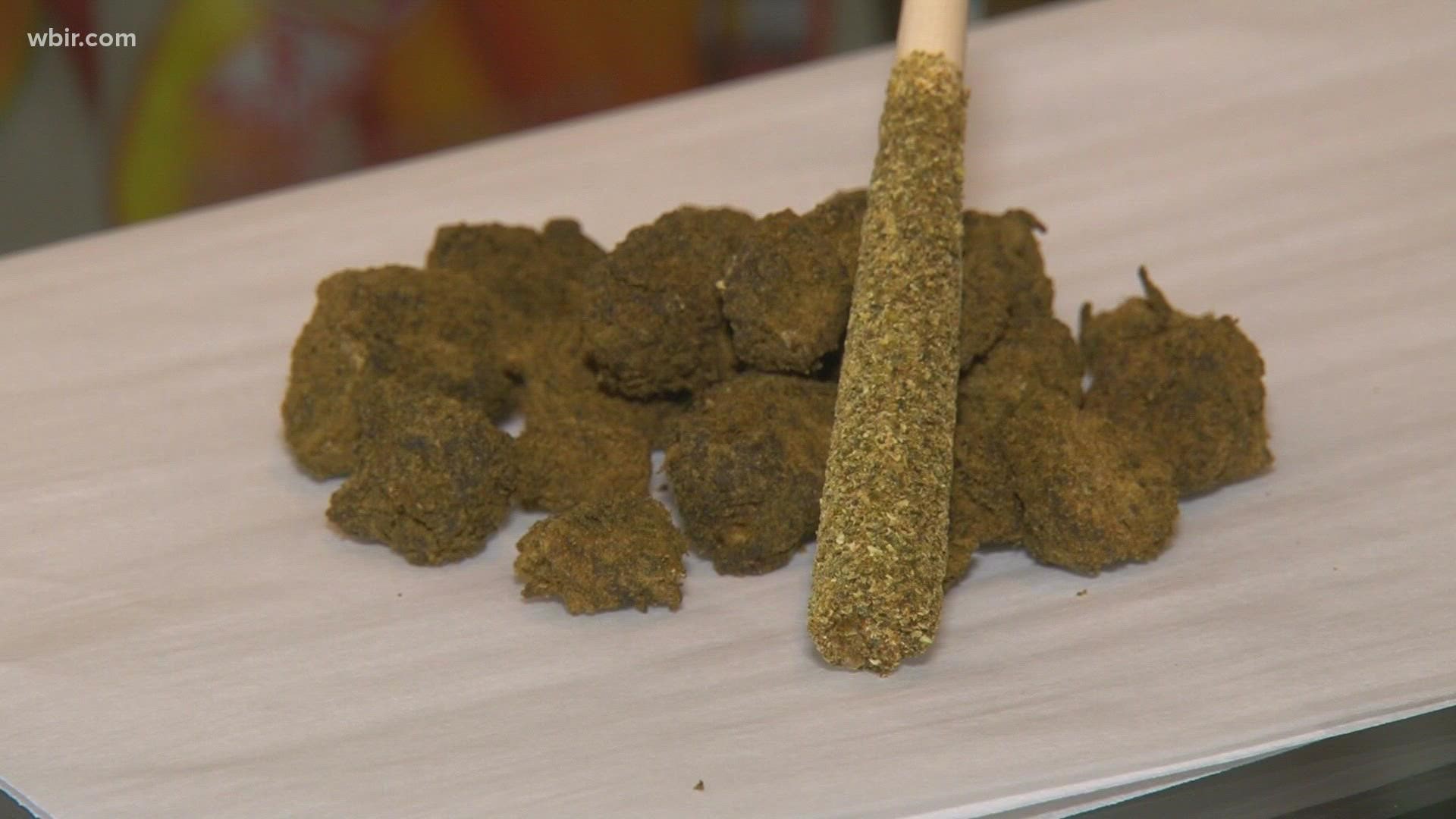KNOXVILLE, Tenn. — Call it a technicality: THC is simultaneously legal and illegal in Tennessee, depending on what number you put on it and what plant you extract it from.
Even though Delta 9 THC, the major cannabinoid found in marijuana, remains an illegal substance in Tennessee, people in the state can legally get a milder high from Delta 8 THC, a minor cannabinoid found in hemp, in the form of products that are starting to find their way onto the shelves of countless vape and smoke shops across the state.
“It's something you're buying that's legal versus something you're buying that’s illegal,” said Neal Murphy, owner of eVape Lounge in Powell. "Everyone's familiar with the CBD, and they're familiar with the marijuana Delta 9, but there are a lot more cannabinoids in the plant other than just those.”
Delta 8 THC can now be found on store shelves in the form of gummies, syrups, vapes, joints and chocolate bars -- and it provides a similar but milder high compared to Delta 9. Because it falls into a gray area based on the plant it's extracted from, Delta 8 products are all legal to sell and consume in Tennessee.
The USDA’s 2018 Farm Bill which allowed hemp to be grown and sold made this possible. Hemp, and the products extracted from it like CBD, are now legal in Tennessee.
“Now, if you take Delta 8 from marijuana, that's illegal. If you take it from hemp, it’s a hemp product, and that's why it's legal,” Murphy said. "It's not so much a loophole in the law, it's just the law.”
So why weren't Delta 8 THC products rushed to the shelves years ago alongside CBD after the farm bill was passed? Up until recently, CBD extracted from hemp had been driving the majority of sales because it is easy to extract in significant amounts.
CBD is THC's non-psychoactive cousin found in both hemp and marijuana plants, but hemp contains a much higher concentration of CBD where marijuana contains more THC. Most CBD products derived from hemp still contain miniscule trace amounts of natural THC that can't get you high.
However, CBD can be also be converted into Delta 8 THC in labs through isomerization, and because CBD is considered a legal byproduct of hemp, Delta 8 is a byproduct as well via this processing method. That Delta 8 is then concentrated and put into products.
The discovery of the relative ease of processing CBD into Delta 8 has led to this new boom.
Legally, Delta 8 THC products must have less than .03% Delta 9 THC -- just like CBD.
“If you're trying them head-to-head… it's like alcohol,” Murphy said. "If you drink a couple shots versus a beer or something like that, that's a different potency.”
Murphy’s sales went up 30% since his store started selling Delta 8 THC products in the fall of 2020, simply because his customers love it.
It has also brought a new demographic to his customer base looking for something that provides a lighter, legal high compared to marijuana for various reasons.
“I think maybe these people that grew up in the 60s and 70s are getting closer to that older retirement age, and they're coming back to their roots and saying, ‘Hey, this is something I can get legally,’ so it's interesting when you see a 60 to 65-year-old person coming here, and you think they're wanting CBD and they're like, ‘No, no, I want that Delta 8 stuff for my pains, arthritis, aches and stuff like that,’” Murphy said. "A lot of people said that it works better for them than CBD.”
The recent rise of Delta 8's popularity has led to concerns over how it's made and how safe it is for consumption, since the Delta 8 industry is largely unregulated.
Murphy and his customers like Delta 8 THC, but Tennessee State Representative Gloria Johnson (D-Knoxville) is not keen on it, even though she wants to legalize marijuana. She considers the Delta 8 on the market as a less-safe alternative to marijuana akin to synthetic cannabinoid products that were banned in the 2000s.
“Things like this are going to pop up because we're not willing to do the hard work to sit down and talk about this reform and how we go about legalization,” Johnson said.
The U.S. Food and Drug Administration also warns the following, "Delta 8 THC products have not been evaluated or approved by the FDA for safe use in any context. They may be marketed in ways that put the public health at risk.” Feds are worried some manufacturers are cutting corners and employing unsafe practices to process CBD into Delta 8, which they said could could lead to people ingesting harmful contaminates.
From December 2020 through July 2021, only 22 adverse events involving Delta 8 were reported to the FDA by hospitals across the U.S. Some of those events included vomiting, hallucinations, trouble standing and loss of consciousness.
Despite these reports and pushback from lawmakers, Murphy and other shop owners said they will continue to sell Delta 8 THC products in Tennessee for as long as it's legal.
“I hope that people see the benefit of Delta 8 and then somewhere down the road, if they legalize marijuana, then we can move on to that side of it,” Murphy said.
Until the potential legalization of marijuana, Rep. Johnson said she's working to garner bipartisan support for new legalization.
“Farmers support it, we need a new cash crop, our neighbors are all doing it... what's the problem with Tennessee?” Johnson said.
More than 16 states have already banned the sale of Delta 8 THC, including some states where recreational marijuana is legal.
In Tennessee, those 21 and older can purchase Delta 8 THC products in vape shops. Like any product, people are urged to consult with their doctor before consuming something for health reasons.

